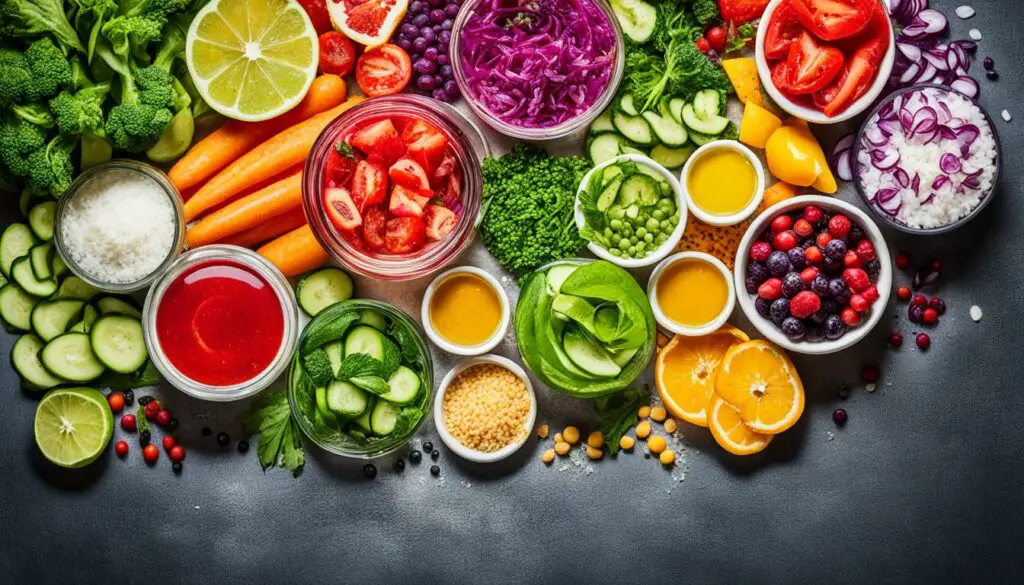Imagine a bustling kitchen, filled with the aroma of sizzling garlic and caramelizing onions. The chef, Sarah, expertly balances flavors as she swirls a vibrant sauce in her skillet. But there’s one secret ingredient that takes her dishes to the next level – rice vinegar. Its tangy and acidic profile adds a tantalizing zing that enhances the taste of her creations.
For Sarah, rice vinegar is more than just a staple in her pantry; it’s a culinary game-changer. Whether she’s marinating tender slices of meat, creating a homemade dressing for a crisp salad, or stir-frying colorful vegetables, rice vinegar is her go-to ingredient for that perfect balance of flavor.
This versatile vinegar is made from fermented rice and has been used for centuries in Asian cuisines. Its tangy taste and light acidity make it a fantastic addition to various dishes, elevating flavors and adding a refreshing twist.
Rice vinegar’s unique qualities allow it to enhance a wide range of recipes, from sushi rice and pickled vegetables to tangy sauces and marinades. It pairs beautifully with ingredients like soy sauce, ginger, and sesame oil, creating a symphony of flavors that dance on the palate.
But it’s not just about taste – rice vinegar also offers an array of health benefits. It aids in digestion, supports weight loss goals, and provides valuable nutrients. So, not only can you delight your taste buds with the tang of rice vinegar, but you can also nourish your body at the same time.
Are you ready to embark on a culinary adventure and discover the wonders of rice vinegar? Join us as we dive into the world of rice vinegar, exploring its uses, unveiling its benefits, and sharing delicious recipes that will elevate your cooking endeavors.
Table of Contents
Key Takeaways:
- Rice vinegar adds a tangy and acidic flavor that enhances the taste of various dishes.
- It is a versatile ingredient that can be used in marinades, dressings, sauces, and more.
- Rice vinegar offers health benefits, including improved digestion and potential weight loss support.
- Stay tuned for mouthwatering recipes that showcase the versatility of rice vinegar.
- Looking for alternatives? We’ll also explore rice vinegar substitutes and recommend top brands.
Exploring the Uses of Rice Vinegar
In this section, we will delve deeper into the different uses of rice vinegar in cooking. Rice vinegar is a versatile ingredient that can add a tangy, refreshing acidity to a wide range of dishes. Let’s explore how you can incorporate rice vinegar into your culinary creations.
As a Marinade:
Rice vinegar works wonders as a marinade for meats and seafood, tenderizing them while infusing them with a delightful flavor. Its tangy notes complement various marinade ingredients, such as soy sauce, ginger, garlic, and honey. Try marinating chicken, beef, or shrimp in a mixture of rice vinegar, soy sauce, minced garlic, and a touch of honey for a delicious twist on your favorite grilling recipes.
In Dressings and Sauces:
Rice vinegar makes for an excellent base in salad dressings and dipping sauces. Its acidity helps balance out the richness of oils and creamy ingredients, resulting in a well-rounded flavor profile. Create a refreshing salad dressing by whisking together rice vinegar, olive oil, Dijon mustard, honey, and a pinch of salt. Or elevate your stir-fry game by incorporating rice vinegar into your homemade sauce, adding a tangy kick to your vegetable and protein medley.
For Pickling:
Pickling vegetables is a fantastic way to preserve their freshness and add a burst of flavor to your dishes. Rice vinegar, with its mild acidity, is an ideal pickling liquid that imparts a tangy taste without overpowering the natural flavors of the vegetables. Consider making quick pickles by combining cucumbers, carrots, and radishes with rice vinegar, sugar, and salt. Let them sit for a few hours or overnight for a zesty, crunchy accompaniment to your meals.
In Sushi Rice:
Sushi rice is a staple in Japanese cuisine, providing the perfect base for sushi rolls, nigiri, and bowls. Rice vinegar plays a crucial role in achieving the authentic taste and texture of sushi rice. It helps season the rice while adding a subtle tang that balances the richness of the fish and other ingredients. Simply add rice vinegar to cooked sushi rice and gently fold it in for a well-seasoned, sushi restaurant-worthy rice.
Now that you have a better understanding of the uses of rice vinegar in cooking, you can experiment with incorporating it into your favorite recipes. The possibilities are endless, and the tangy flavor of rice vinegar is sure to enhance your culinary creations.
| Recipe | Usage |
|---|---|
| Tangy Asian Salad Dressing | Whisk together rice vinegar, sesame oil, soy sauce, honey, grated ginger, and garlic for a vibrant salad dressing. |
| Grilled Teriyaki Chicken | Marinate chicken thighs in a mixture of rice vinegar, soy sauce, brown sugar, garlic, and pineapple juice for juicy, flavorful grilled chicken. |
| Quick-Pickled Cucumbers | Combine thinly sliced cucumbers, rice vinegar, sugar, salt, and fresh dill for a tangy and refreshing pickle to accompany sandwiches or burgers. |
| Zesty Stir-Fry Sauce | Mix together rice vinegar, soy sauce, honey, cornstarch, and a splash of sesame oil to create a bold and tangy stir-fry sauce. |
Unveiling the Benefits of Rice Vinegar
Rice vinegar not only adds a delightful tang to your favorite dishes but also offers a range of health benefits. Incorporating this versatile ingredient into your meals can contribute to improved digestion, weight loss, and enhanced nutrient intake.
Promotes Digestive Health
Rice vinegar has been used for centuries to aid digestion. Its natural acidity helps stimulate the production of digestive enzymes, facilitating the breakdown of food and improving nutrient absorption. Regular consumption of rice vinegar can alleviate symptoms of indigestion, bloating, and gas.
Aids in Weight Loss
If you’re on a weight loss journey, rice vinegar can be your secret weapon. Studies suggest that acetic acid, a component in rice vinegar, may increase metabolism, reduce appetite, and promote fat burning. Adding a splash of rice vinegar to your salads, marinades, or sauces can help you feel fuller for longer and support your weight loss goals.
Rich in Valuable Nutrients
Rice vinegar is a rich source of essential nutrients that contribute to overall well-being. It contains vitamins and minerals like potassium, magnesium, and iron. These nutrients play various roles, from maintaining healthy blood pressure to supporting red blood cell production.
“Rice vinegar is an excellent addition to any diet. Its health benefits extend beyond its taste, making it a smart choice for those mindful of their well-being.”
Incorporating rice vinegar into your cooking can be a simple yet impactful way to boost your overall health and well-being. Whether it’s adding a splash to your stir-fries or using it as a dressing for your salads, the benefits of rice vinegar extend far beyond its tangy flavor.

Next, we’ll explore a collection of tantalizing rice vinegar recipes that will elevate your culinary creations. From Asian-inspired dishes to refreshing summer salads, get ready to dazzl
Elevate Your Culinary Creations: Rice Vinegar Recipes
Looking to add a flavorful twist to your favorite dishes? Look no further than these mouthwatering rice vinegar recipes. Whether you’re a seasoned chef or just starting out in the kitchen, these recipes are sure to impress. From sushi rice to salad dressings, stir-fries to pickled vegetables, the versatility of rice vinegar shines through in these delectable creations.
1. Sushi Rice
If you’re a fan of sushi, making your own sushi rice is a game-changer. The secret lies in the combination of rice vinegar, sugar, and salt. This simple recipe guarantees perfectly seasoned sushi rice every time.
2. Tangy Cucumber Salad
Light, refreshing, and bursting with flavor, this tangy cucumber salad is the perfect side dish for any meal. With just a few ingredients, including rice vinegar, soy sauce, and sesame oil, you’ll create a zesty salad that complements any cuisine.
3. Sweet and Sour Stir-Fry
Take your stir-fry game to the next level with this sweet and sour masterpiece. The combination of rice vinegar, honey, and soy sauce creates a harmonious balance of flavors. Load it up with your favorite vegetables and protein for a satisfying meal.
4. Pickled Vegetables
Transform ordinary vegetables into tangy, crunchy delights with this easy pickling recipe. Rice vinegar, along with spices and herbs, elevates the flavors of the vegetables, turning them into a tasty snack or a colorful addition to salads and sandwiches.
5. Tangy Rice Vinegar Dressing
Looking for a versatile dressing that goes well with salads, bowls, and even grilled meats? This tangy rice vinegar dressing is the answer. With its combination of rice vinegar, olive oil, garlic, and Dijon mustard, it adds a zingy kick to any dish.
Discover the endless possibilities of cooking with rice vinegar by trying these recipes. Each dish showcases the tangy and versatile nature of rice vinegar, elevating your culinary creations to new heights. Whether you’re looking to enhance the flavors of your favorite Asian dishes or add a unique twist to traditional recipes, rice vinegar is the secret ingredient you need.
Exploring Rice Vinegar Substitutes and Brands
While rice vinegar is an essential ingredient in many recipes, there may be times when you find yourself in need of a substitute. Whether you’ve run out of rice vinegar or simply prefer a different flavor profile, it’s helpful to know what alternatives are available. Additionally, choosing the best rice vinegar brand can elevate your culinary creations to new heights. In this section, we’ll explore rice vinegar substitutes and recommend some of the top brands on the market, empowering you to make informed decisions for your cooking needs.
Substitutes for Rice Vinegar
When looking for a rice vinegar substitute, there are a few options that can provide a similar tangy flavor. One common substitute is apple cider vinegar, which has a slightly fruity taste that works well in many recipes. Another alternative is white wine vinegar, which offers a subtle acidity that can mimic the flavor of rice vinegar.
For a milder option, consider using lemon or lime juice as a substitute. These citrus juices can provide a refreshing acidity that complements a variety of dishes. If you prefer a sweeter flavor, you can try using balsamic vinegar as a substitute, but keep in mind that it will significantly alter the taste of your recipe.
Best Rice Vinegar Brands
When it comes to choosing the best rice vinegar brand, there are several factors to consider, including quality, flavor, and availability. Below are some highly recommended brands known for their exceptional rice vinegar:
- Kikkoman: A renowned Japanese brand that produces high-quality rice vinegar with a well-balanced flavor.
- Marukan: Widely recognized for its authentic and flavorful rice vinegar, Marukan offers various options, including seasoned and organic varieties.
- Mizkan: With a long history in Japanese cuisine, Mizkan produces rice vinegar that adds a distinct tang to dishes.
- Nakano: Known for its seasoned rice vinegar, Nakano offers a range of flavors to enhance your recipes effortlessly.
- Three Crabs: This brand from Vietnam is famous for its delicate rice vinegar, making it an excellent choice for Asian-inspired dishes.
These brands consistently deliver top-quality rice vinegar that enhances the taste of your culinary creations. Whether you’re making sushi, stir-fries, or salad dressings, using a reputable brand can make a noticeable difference in the final result.
Now that you’re aware of rice vinegar substitutes and the best brands available, you can confidently experiment with different flavors and choose the right product for your cooking needs. Let’s move on to the concluding section, where we’ll recap the key takeaways from this article and leave you inspired to harness the tangy goodness of rice vinegar in your dishes.
Conclusion
Throughout this article, we have explored the wonders of rice vinegar and its ability to enhance flavors in cooking. With its tangy taste and versatility, rice vinegar can be used in a myriad of ways to elevate your culinary creations.
From marinades and dressings to dipping sauces and pickled vegetables, rice vinegar adds a refreshing acidity that brightens up any dish. It pairs perfectly with various cuisines, whether you’re cooking Asian-inspired stir-fries or experimenting with fusion flavors.
Not only does rice vinegar bring a tangy punch to your meals, but it also offers health benefits. Studies suggest that consuming rice vinegar may aid in digestion, promote weight loss, and provide valuable nutrients. Incorporating this tangy ingredient into your cooking can both tantalize your taste buds and support your well-being.
In conclusion, we encourage you to explore the uses of rice vinegar in your own kitchen. Let its tanginess inspire your culinary adventures and transform your dishes into flavorful creations. Whether you’re an experienced chef or a novice cook, rice vinegar is a versatile ingredient that can take your cooking to new heights. So grab a bottle of rice vinegar and enjoy the journey of enhancing flavors with its delightful tang.
FAQ
What is rice vinegar?
Rice vinegar is a type of vinegar made from fermented rice. It is widely used in Asian cuisine for its unique tangy flavor and versatility in various dishes.
What are the uses of rice vinegar?
Rice vinegar can be used as a marinade for meats, a dressing for salads, a dipping sauce for sushi, or a flavor enhancer in stir-fries. Its acidity adds a refreshing twist to a wide range of recipes.
What are the benefits of rice vinegar?
Consuming rice vinegar may aid digestion, promote weight loss, and provide valuable nutrients like acetic acid and antioxidants. It has been studied for its potential health benefits and is a popular ingredient in traditional medicine practices.
Can rice vinegar be substituted with other vinegars?
Yes, if you don’t have rice vinegar, you can substitute it with other mild and tangy vinegars like white wine vinegar or apple cider vinegar. However, keep in mind that the flavor profile may vary slightly.
What is the best rice vinegar brand?
Some popular rice vinegar brands include Marukan, Kikkoman, and Nakano. These brands are known for their quality and authentic flavors. It ultimately depends on personal preference, so you can experiment with different brands to find your favorite.
How do I make rice vinegar at home?
Making rice vinegar at home requires a fermentation process using rice, water, and a starter culture. It can be a time-consuming and intricate process, so it’s often more convenient to purchase commercially-made rice vinegar.
What is the difference between rice vinegar and apple cider vinegar?
Rice vinegar is made from fermented rice, while apple cider vinegar is made from fermented apple cider. They have distinct flavors, with rice vinegar being milder and slightly sweet, while apple cider vinegar has a more robust and fruity taste.
What are some rice vinegar recipes I can try?
There are numerous rice vinegar recipes to explore. Some popular options include sushi rice, cucumber salad with rice vinegar dressing, stir-fried vegetables with a rice vinegar glaze, and pickled carrots or radishes using rice vinegar. The possibilities are endless!






